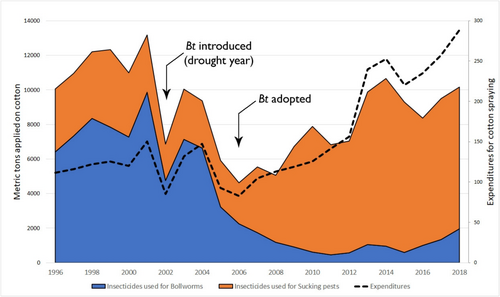Thirty years on, GM crops encounter the Jevons paradox: initial efficiencies in pesticide use have led to massive increases in those pesticides . While individual farms can spray less, at first, this allows more people to plant more land and thus spray more. But, farms are ecological systems too. Initial "efficiencies" in spraying lead to new niches meaning new and different spraying regimes as on Indian Bt cotton farms. The expansion of these crop-chemical regimes takes place in a context where herbicides, especially glyphosate, are getting cheaper and facing pressure from a large generics market. Ultimately, the Jevons Paradox appears because a new efficiency makes something seem to be essential to the world, foreclosing other possible futures. Its not just that people spray more, its that spraying becomes a necessary part of agricultural work. This is a feature, not a bug of these systems.
Flachs, Andrew, Glenn Davis Stone, Steven Hallett, and K.R. Kranthi. 2025. “GM Crops and the Jevons Paradox: Induced Innovation, Systemic Effects and Net Pesticide Increases From Pesticide-Decreasing Crops.” Journal of Agrarian Change. https://doi.org/10.1111/joac.70006
